Many parents are faced with problems of violation of the chair from the very first days of a child's life. After all, the ideal option is when a baby eats well, sleeps well and for a long time, does not cry and is not capricious, normally poops, is extremely rare. With any deviations and changes in the chair, mothers usually start to panic.
The mucus in the feces in infants is present quite often, and this is not considered a pathological phenomenon. Such a chair acquires a light color and a jelly-like or watery texture. With the help of mucus, the intestine is protected from the effects of such aggressive substances as alkalis and acids, therefore the presence of mucus in the feces is absolutely normal. However, at the exit it should not be noticeable, since normally it should be mixed with stool even in the colon. Therefore, the presence of individual fragments of mucus, highly visible and visible to the naked eye, should alert the parents.
If the appearance of mucus in the feces is a very rare phenomenon, and its amount is small, then there are no special reasons for alarm. In the case when the elements of mucus are present at each emptying, and there is also a sharp, strong unpleasant smell, sleep disturbance, frequent regurgitation, stopping weight gain, diarrhea and blood interspersions in feces, you can talk about serious health problems of the baby. However, the absence of other symptoms, in addition to the presence of mucus in the feces, most often indicates that the causes of its appearance are lighter.
Symptom: mucus in the feces of the baby
The appearance of mucus in the feces of the infant may be associated with the following problems:
- If mucus is found in the feces of a child who is on breastfeeding, you must first check your breast milk for sterility. For this there is a special analysis. However, this does not mean that you need to stop breastfeeding your baby. Even if any microorganisms are found in the milk, breastfeeding is most often continued. But in this case, the mother and the baby will have to undergo a certain course of therapy.
- One of the causes of mucus in the feces is lactose deficiency.
- It is also worth reviewing the diet of a nursing mother, because the mucus in the feces of the infant may show intolerance to certain foods or an allergic reaction. It is also desirable to do a blood test for the identification of allergens (MAST test). Help the mother to determine what products the baby such a reaction, can the food diary.
- Mild diarrhea and mucus in the feces may appear in infants after the introduction of new products into their diet. Especially often kids react to vegetable puree like that. When a reaction to the supplements appears, it is worthwhile for some time to abandon the new product or reduce a single portion.
- If diarrhea and mucus are not associated with the introduction of complementary foods, they can be symptoms of a disease of the digestive system. You can check this by passing tests to determine the intestinal microflora.
- In the first few days, mucus formation in the feces of the newborn is associated with transient dysbacteriosis. This condition does not require treatment.
- In rare cases, the appearance of mucus in the feces occurs in diseases of the respiratory system, for example, with a cold.
- The cause of mucus can also be taking certain drugs, for example, Espumizana.
Thus, if mucus appears in the feces, you must first check the mother's milk and review the diet of the nursing mother. Then, in the absence of results, they proceed to the examination of the baby. If there are any health problems, it is necessary to make a diagnosis and start treating the disease immediately, without delay, because otherwise you can lose time and aggravate the pathology. The correct course of the examinations will be made by a specialist, including all the required analyzes. If it is not possible to immediately go to the doctor, then you can give your baby probiotics and Smektu.
Normally, the baby’s gastrointestinal tract is sterile at birth. After he begins to eat, even mother's milk, various microorganisms appear in the intestines, a certain microflora develops. Bifidobacteria and lactobacilli are considered beneficial microorganisms. There are also conditionally pathogenic microbes, saprophytic and pathogenic microorganisms.
In the first month of a child’s life, there is a “struggle” in its intestines for the predominance between beneficial and pathogenic bacteria. By the end of this period, such an equilibrium in the norm should be decided in favor of lacto-and bifidobacteria. And the threat of colonization by pathogens should be eliminated.
The period of struggle is characterized by a transitional chair. At this time, mucus in the feces and a greenish color are not considered pathological. By the end of 3-4 weeks of life of the baby, the chair should get better, acquire a natural color and texture. But there are various situations that go beyond the limits of the norm, which can affect the color, frequency, texture and the appearance of various impurities, such as mucus in the feces.
What problems can be associated with mucus in the feces, and when should special attention be paid to it?
Intestinal dysbiosis
This abnormality is one of the most common causes of problems with stools in young children. Pathogenic bacteria (clostridia, staphylococcus, Klebsiella, enterobacteria and others) in the intestines of a baby can multiply and prevail over beneficial microorganisms, resulting in various stool disorders. With a mild form of dysbiosis, the child usually has mucus in the feces, flatulence and constipation. In more severe cases, diarrhea is observed, lumps of curdled milk, lots of mucus and blood streaks may appear in the feces. If a red mucus is found in the feces, this indicates ulceration of the mucous membranes of the digestive tract.
Dysbacteriosis treatment is complex and rather long. First, carry out the baby's intestinal sanitation, using drugs such as stop-diar, Enterofuril or various bacteriophages. After that, they spend a monthly course of microflora restoration using Bifiform, Primadofilusa, Lineksa, Normoflorin or other means prescribed by a doctor.
Dysbacteriosis can easily recur, even correct and careful treatment does not give a full guarantee that the disease will not recur. This can only be prevented by proper feeding and careful rational child care.
Acute intestinal infections of bacterial or viral origin
Mucus in the feces of infants often becomes one of the manifestations of intestinal infections. The baby can get dysentery, salmonella, intestinal flu, toxinfections and other diseases. In such cases, fragments of mucus in the feces say about the occurrence of inflammatory processes in the intestine. In order to differentiate intestinal infections from dysbiosis, you need to consult a doctor and analyze the infection by seeding feces.
For children under the year, with noticeable changes in the stool, a consultation with an infectious disease specialist is indicated. Do not give up the proposed hospitalization, because it can affect the health and even the life of the baby, especially with obvious signs of dehydration.
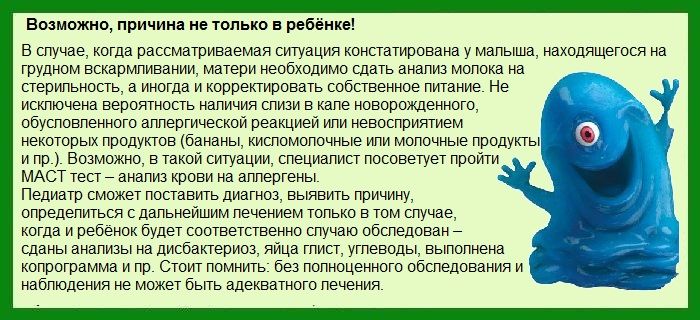
Intestinal invaginitis
This pathology belongs to the most dangerous diseases. If you suspect it is necessary to urgently call an ambulance. Intestinal invaginitis is characterized by the formation of partial intestinal obstruction. This condition arises as a result of squeezing a part of the intestine with another part of it. Symptoms of the disease are severe pain during feeding and after eating, uncontrollable vomiting "fountain". The stool is first frequent, having a liquid consistency and impurities of blood and mucus, gradually it begins to lose its fecal character. After one day, the child’s feces are lumps of mucus with bloody veins.
In this disease, the treatment is carried out by a surgeon, straightening the squeezed bowel with a barium enema. If you do not take timely measures, the baby may die from pain shock, sepsis or dehydration.
Incorrect introduction of complementary foods, errors in the nutrition of infants
The reasons for the change in the stool may also lie in the improper organization of nutrition of the child. The lack of fluid, the sudden introduction of complementary foods, too long intervals between feedings - all this can cause mucus in the feces, as well as various dyspeptic symptoms. Often the cause of such changes is the introduction vegetable puree. In addition to mucus in the feces, in such cases the consistency and color of the stool may change. If this happens, then you need to revise and adjust the diet and mode of the day baby. It may be better to give up for a few days (until the stool is normalized) from complementary foods, and then try again. new Productbut more smoothly.
Lactase deficiency
Another problem that can lead to the appearance of mucus in the feces of a baby is lactase deficiency. The lactase enzyme is necessary for the body to ferment milk, more precisely lactose (sugar contained in it). A child may have a congenital deficiency of this enzyme, in addition, lactase is destroyed when a large number of pathogens are present in the small intestine. The result is fermentation processes in the intestines, which are manifested by abdominal pain, flatulence, gas, diarrhea, lumps of milk and elements of mucus appear in the feces.
For the diagnosis of applied test for carbohydrate content in feces. Treatment is a special diet that excludes all dairy products. Also, the baby is prescribed lactase preparations, if he is breastfed, the artificialists are selected a mixture that does not contain lactose.
Celiac disease or gluten deficiency
Pathology is in many ways similar to lactase deficiency, but in this case, lack of lactase is not primary. Deficiency of other enzymes of the body, forming gluten insufficiency, becomes more pronounced. Modern medicine with its diagnostic methods allows to determine such a state, and the selection proper diet deal with it.
Allergic reactions, atopic manifestations
The first manifestations of allergy are usually skin lesions, which can be a peeling, weeping, rash on different parts of the body, usually on the cheeks, face, head. However, an allergic reaction can also affect the mucous membrane of the digestive organs, causing the appearance of mucus in the feces of the infant.
Runny nose
Little children still can not independently clear the nose of mucous secretions in a cold. Therefore, most of the mucus enters the pharynx, slides over it and is swallowed. This may be the cause of the appearance of clear mucus in the feces.
Medications
Not always mucus in feces is a sign of pathology. Her appearance can be triggered by taking drugs for swelling, such as Bobotic, Bebikalm, Espumizan and others. After the end of the application medicinal product impurities of mucus will disappear.
Thus, when any changes in the baby’s stool, and especially mucus in the feces, causing suspicion of pathology, it is worth consulting with the district pediatrician. Only a qualified doctor will be able to determine if an active intervention, dietary change or a thorough examination is required.
Often parents are worried about the appearance of mucus in the baby’s feces. In some situations, this phenomenon is a reaction of the organism to a new product, and in others it is a symptom of the disease. In which cases mucous stool is the norm, and in which - the pathology?
In the period of several days after birth, the baby’s chair has almost black color with a greenish tinge and particles of mucus. There is no need to worry about this, as the exiting substance is meconium - a product of the processing of substances that the infant received from the mother during her pregnancy. Typically, the color and consistency of feces begin to return to normal after 4 days.
Normal baby’s stool is similar in consistency to thick sour cream. It should have a yellow color and a sour smell, with a little bit of mucus in it.
In the event that a child has a great state of health and good appetite, parents should not worry. The slime veins are side effect increased load on the bowel.
In the baby’s feces, changes are constantly occurring due to different diets of the mother. In the event that a woman has used a new product, the child who is breastfed will respond by changing the color of the feces and their composition. The child’s chair has a constant texture and color characteristic. bottle feeding. If an artificial feeding is observed in a child with a change in the consistency of fecal masses or the amount of mucus increases in the feces, it is required to consult a doctor.
The appearance of transparent mucus in an increased amount with a standard color and the smell of fecal masses shows that the baby’s intestine does not cope well with the loads. In this case, the blotches can be lumps or stripes. To normalize the condition of the child, the mother needs to adjust her diet. You can not eat fried and fatty, as well as sweets. Mucous patches disappear as soon as a woman changes her menu.
Mucous formations in the feces may be the result of complementary foods, if it began to be introduced into early age or in large volumes. In this case, it is necessary either to abandon the lure for a while, or to reduce its quantity.
There are cases when white mucus is visible in the baby’s feces. In the presence of such discharge, an urgent need to consult a doctor and pass all the necessary tests. We list the possible causes of such fecal masses.
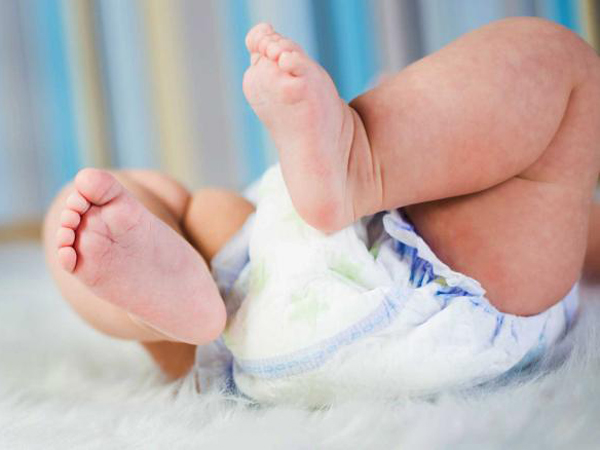
If the baby is already 1 year old and he poops exclusively with mucous masses, you need to call an ambulance and go to the hospital for an examination. This phenomenon can be caused by atopic constipation or polyps, tumors in the intestine. To help your child with this diagnosis, surgical treatment is necessary.
During the first month of life, digestive and intestinal problems are normal. In the event that after the age of 1 month the stool has not normalized, it is required to show the baby to the doctor.
Mucous diarrhea
Dysbacteriosis is characterized by a liquid stool in which mucus is present, and its color and smell remain the same. To confirm this diagnosis, you should pass the biomaterial for research. Dysbacteriosis is a violation of the microflora in the intestine, and it is quite simply treated. To do this, they can assign special probiotics and correct the menu of a nursing mother.
If it is not possible to consult a doctor, the baby should accept Smekt. For a newborn baby, you must dilute 1 sachet of this medicine for the whole day. The course of treatment is 1 week. In the morning it is necessary to divide all the substance in the bag into the required number of parts and dilute each of them separately with water.
Smecta is a harmless drug that is completely eliminated from the body along with toxins. When using other drugs Smektu need to drink before them for two hours. There is no need to increase the dosage, since this action can cause constipation in the baby.
When diarrhea can not feed the baby less or replace breast milk mixtures, as it is in this product are substances necessary for the speedy normalization of the digestive process. The elements contained in breast milk inhabit the baby’s intestines with the necessary microorganisms that are responsible for normal stools.
If diarrhea does not go away, you must urgently call a doctor to prevent dehydration of the child’s body.
If the baby has the following symptoms, you need to call an ambulance.
- Accompanying mucous diarrhea vomiting.
- Increased temperature in infants.
- In the feces in addition to mucus is blood.
- The baby’s chair is watery. He poops more than 10 times a day.
- There is a weight loss.
- In the first 3 months, weight gain of less than 125 g in 30 days occurs.
- There is a fetid smell from the mouth.
- Baby pissing less than 6 times a day, and his urine has an unpleasant smell.

The fight against mucous patches
When dysbacteriosis prescribe such drugs as Bifidumbakterin, Smekta and Linex, which within 1 week can adjust the baby's chair.
If intestinal malfunctions are associated with an allergic reaction to bottle feeding, it is necessary to choose another formula for the baby. The mixture, which already contains prebiotics in the required doses for the baby, will help to cope with such problems. Basically, the change of such nutrition is able to remove the mucous lumps from the baby’s feces, which will be caused by the normalization of the bowels.
Other treatment of mucous secretions along with feces should be carried out only under the supervision of a physician. A typical treatment can be prescribed exclusively by a physician, based on the diagnosis.
Mother can help get rid of the mucous formations in the feces of the baby, adjusting their diet.
In this article:
Mucus in the feces of infants, can be found from the first day of life. And there is no need for clinical signs, pathologies, the child can behave calmly, without giving signs of anxiety. If a baby has a regular stool with mucus, but at the same time it behaves naturally, eats well, sleeps on schedule, plays with enthusiasm, young parents should not panic.
The presence of mucus is in every baby who has recently been born. It is even good that it exists, since its presence protects the still weak intestine from acids and alkalis. The mucus envelops the colon, holding the stool, with a large selection goes along with the feces. Over time, the feces become mushy, in structure resembling sour cream. When breastfeeding, it has a yellowish color and a sour odor. The mucus in the baby’s stool will be present for a few more months, but over time its amount will significantly decrease.
When to sound the alarm?
Parents should seek the help of a doctor if they saw blood in the stool in the infant with an unpleasant pungent odor. The presence of such a symptom suggests that the baby has an intestinal infection - dysbacteriosis. If the balance of pathological and normal bacteria in the rectum is disturbed, mucus is very abundant, it acts as a defense that does not allow bacteria to enter the body through the intestinal walls.
In case of pathology, parents should be calm, reasonably reasoned and not delayed with treatment. How to determine the presence of pathology, many will ask? Symptoms will manifest instantly. The baby will begin to lose weight, and quickly, restless sleep and frequent crying should also alert the young parents.
Causes of mucus
In children who are on HB, they test their feces with a special analysis for sterility. If the infection is present in the intestine, pathogenic microorganisms will appear. The first reason due to which a newborn may have mucus in the feces is mine-mastitis. In case of confirmation of this diagnosis, it is worth refusing to breastfeed, transfer the baby to the mixture, and mother is recommended to follow a diet.
Appearing liquid stool in the baby indicates improper introduction of complementary foods. Usually abrupt change of diet leads to indigestion. Vegetables contain fiber and when released into the stomach are not always processed quickly. The adaptation period will show how the body behaves with the introduction of a new product.

Appearing sopelki (runny nose) can also cause slime in the baby’s feces. Antibacterial drugs taken with bronchitis also provoke mucus secretions in the intestines. The fact is that when taking antibacterial agents, all lactic acid bacteria come out, this provokes the onset of dysbacteriosis. Many medicines have the same effect, therefore nursing babies they are prescribed only as a last resort.
In case of poisoning or inflammation in the intestine, pathology can develop. The cause of weakness in the baby can be diseases of the pancreas, they lead to a reduction in the production of the digestive enzyme. Salmonellosis, that's the worst thing. This dangerous intestinal infection causes not only diarrhea, but also pain in the baby’s tummy. Therefore, do not delay with treatment.
How is the treatment?
A young mother, who first discovered mucus in the feces, wonders how to collect it from the infant in order to be tested. In pharmacies for sale a special device for collecting feces. It is a bag made of soft polyethylene with a sticky base. Sticky bag must be fixed so that the anus is in the inside of the bag. When the baby poop, bag must be removed and closed.
In addition, the mother will need to pass breast milk to check for sterility. If there are bacteria in it, you should contact the experts and treat mastitis. The sooner the bacteria are eliminated, the sooner breastfeeding can be restored. In addition, doctors may prescribe to parents, pass a stool analysis for sterility, egg list and hidden blood. A young mother should reconsider her diet, find substances that cause an allergic reaction in the baby.
The ideal option would be to pass an analysis to detect the presence of allergic substances using the MAC test.
These same tests will need to become a baby. Only in this way can we find out whether there is really mucus in the baby’s feces, after which the stage of treatment of the pathology begins.
It is worth paying special attention to the excrement of the crumbs in the period of the beginning of the introduction of fruit foods. It is necessary to monitor the general condition of the baby to determine the product causing an allergic reaction or diarrhea. It happens that these disorders are caused by a congenital deficiency of the enzyme lactase.
In any case, when parents detect mucus in the feces of a newborn, first of all it is necessary to seek help from your pediatrician. Only a doctor can prescribe effective treatment if needed.
Vidio on stool and urination rates in newborns
Not always mucus in feces baby should alarm moms. If there is little mucus, you see it infrequently, and the child doesn’t bother with anything, most likely there’s no reason for panic. But if the mucus in the stool is accompanied by other disturbing symptoms, immediately inform the pediatrician.
A small amount of mucus in the stool of a newborn is not considered a pathology. A baby is born with a sterile intestine and the first month of its life the intestine is filled with bacteria, both beneficial and harmful, but as a result, the number of beneficial bacteria must be greater. Consider the main causes of mucus in the baby’s stool:
- Microorganisms in mother's milk. If the problem is that pathogenic microorganisms get from the mother's milk to the baby, both of them need to undergo a course of treatment without stopping breastfeeding. There is a special test that allows you to check breast milk for sterility.
- Lactase deficiency. With a lack of such an enzyme as lactase, breast milk is poorly absorbed, there is indigestion, gas, abdominal pain, diarrhea and mucus in the feces. There are special drugs to compensate for the lack of lactase in the body of a child.
- Not proper nutrition. A nursing mother should be very attentive to her diet. She can not eat spicy, very salty, smoked or a lot of fried. Otherwise, breast milk will be poorly absorbed and the child will feel discomfort.
- If, in addition to mucus, there is diarrhea or blood in the feces, you should immediately consult a doctor. The cause may be various bowel diseases that need to be started as early as possible.
- If you notice mucus after giving the baby some mashed potatoes for the first time, there is a chance that this food is simply not absorbed in its stomach. Try to stop luring for a while. If the mucus has disappeared, then this product is still difficult for the child to digest.
- Bronchitis or runny nose. During bronchitis or rhinitis, the kids swallow a lot of mucus, because they do not yet have an expectorant reflex. You can see this mucus in the stool.
- During dysbiosis, mucus in the feces is not uncommon. The chair generally becomes irregular.
- Constipation may alternate with diarrhea.
- Acceptance of some drugs. When you take some cough medicine, colic, or antibiotics, mucus appears in the stool.
Symptoms that often accompany mucus in the stool
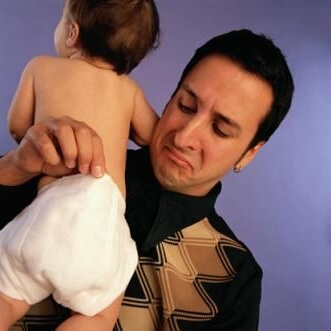
Often, mucus in the stool is just one of the symptoms of the problem.
Mucus in the stool is rarely a separate phenomenon. Often it is accompanied by other signs that may indicate the reason for its appearance. One of these symptoms is abdominal pain. At the same time, the child cries for a long time, eats badly, does not sleep and starts screaming even more when you try to touch his stomach. This may be a sign of increased gas, indigestion, lactase deficiency. To remove the pain, attach a warm diaper to the baby’s tummy or hold it close to you so that the belly warms with the warmth of your body.
Another symptom that accompanies mucus in the feces is an atypical stool. If you notice that the feces have changed color, become greenish, non-uniform, or lumps or thickening have appeared in it, this is an alarming sign that indicates adverse processes in the intestine. Notify your pediatrician, he will assign the appropriate tests.
Mucus in the stool may be accompanied. This may indicate both polyps in the intestines and other possible diseases. If a child cannot go to the toilet on his own for several days, put an enema or a glycerin suppository to prevent an obstruction. One-time constipation indicates flaws in the diet, but if constipation is constant, additional tests should be performed. Burping is also common in babies along with mucus in the stool. Burping itself is not dangerous and should not cause concern. But the child should not regurgitate too often and in large quantities. Regurgitation “fountain” should alert the parents. In addition, you need to make sure that the child does not burp in his sleep and not choked. To do this, put it on its side or on the stomach before eating, so that the air goes out. It can also be a sign of indigestion or lactase deficiency.
An important symptom is the underweight of the child. There is a special table where it is indicated how much the child should add each month of life. If the weight does not grow or even decreases, this can be a sign of a serious illness that requires an immediate solution. In some cases, the cause is a banal underfeeding. The baby does not have enough milk, he cries and does not sleep well, but the mucus in the feces and diarrhea do not appear in this case.
Treatment of mucus in the stool
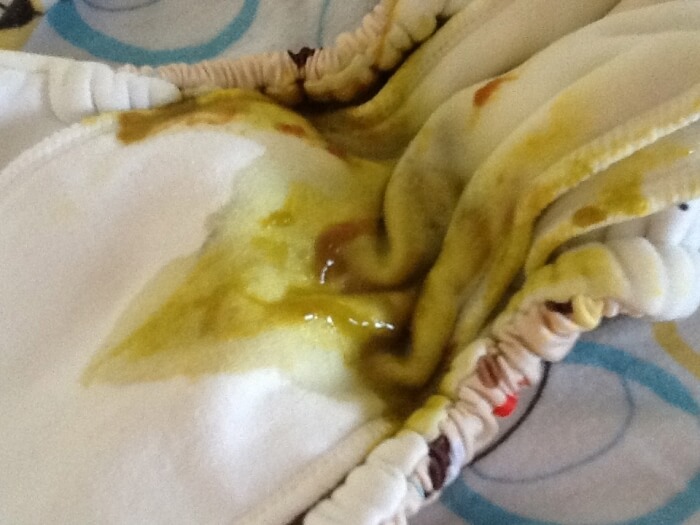
Each specific reason requires its own solution. The first thing to do is to diagnose and determine what caused the presence of mucus in the child’s stool. Then the pediatrician prescribes the treatment. For example, lactase deficiency is treated with drugs such as Lactase Baby or Lactazar. These are capsules containing the enzyme. The contents of the capsule is poured into the mixture or milk at each feeding. Dosage: 1 capsule per 100 grams of milk. You can also buy low-lactose mixtures that are easier to digest.
Usually indigestion is treated by adjusting the diet. Try not to eat spicy and fatty foods. require more serious treatment. Infants can become sick with intestinal flu, dysentery, salmonella, and other infections. In some cases, the child will need hospitalization. Symptoms of infection can be fever, refusal to eat, anxiety, lack of urination for more than 6 hours. With diarrhea, there is a risk of dehydration, so an important point of treatment is to keep the child off with special solutions that prevent the loss of moisture.
Often with intestinal infections prescribed "Smekta" in powder form. This drug binds microbes and removes them from the body. In some cases, the doctor may prescribe antibacterial drugs. They should be taken only on the advice of a doctor and subject to the dosage. These drugs destroy not only pathogenic microbes, but also beneficial bacteria. For intestinal infections, diet is important. It is not recommended to overload the intestines, so in no case should you force-feed the child. You need to allow him to eat by appetite, as much as you want.
With a cold and bronchitis, the pediatrician may prescribe antiviral and expectorant drugs. To prevent the mucus from getting inside, it must be regularly sucked off with an aspirator or a pear and rinsed in the nose. Now in pharmacies a large number of different aspirators to remove mucus from the nose. They are a filter suction device that can be easily disassembled and washed. Do not forget to process it with disinfectants.
If you notice that the mucus in the stool has appeared after the use of drugs for swelling in the form of syrups (Bobotik, Espumizan, Bebikalm), treatment is not required. If there is no effect on the drug, it must be undone, and the mucus will disappear.
Dysbacteriosis and mucus in the stool
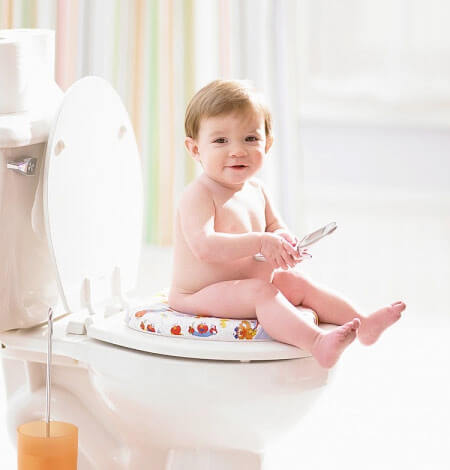
The first months of life the baby’s intestinal microflora is unstable. If, under the influence of adverse environmental factors, the number of harmful bacteria begins to grow rapidly and the number of useful bacteria is exceeded, dysbacteriosis develops. This is the most common cause appearance of mucus in the baby’s feces. It manifests itself in an unstable stool (including mucus), increased gas formation, poor appetite, stomach ache. In mild form, only some symptoms can be replaced, such as mucus, constipation or diarrhea. In the case of severe dysbiosis, diarrhea is quite strong, in the feces a lot of mucus, lumps, you can even see the streaks of blood.
Dysbacteriosis can occur as a result of taking antibiotics that disrupt the bowels and destructive, but they are simply necessary in the treatment of certain infections. If the baby is bottle-fed, the wrong mixture can cause dysbacteriosis. In this case, the doctor will recommend another mixture. Treatment of dysbacteriosis includes taking and Probiotics provide the child's body with necessary beneficial bacteria, and prebiotics create a favorable environment for existing bacteria.
The course of recovery of intestinal microflora is usually quite long. But even careful adherence to all recommendations of the doctor does not guarantee the absence of a relapse. Therefore, after treatment, you need to follow the correct diet and other rules of prevention.
There is an opinion that drugs for dysbacteriosis are absolutely useless for babies. To act, you need to swallow the capsule whole. Then the protective cover will save the medicine up to the moment when it gets into the small intestine. But baby will not be able to swallow the capsule. Therefore, mothers simply add powder to food or milk. In this case, getting into the stomach, are destroyed by the action of gastric juice, and absolutely nothing useful gets into the intestine. Best remedy from dysbiosis is proper nutrition, the selection of the mixture only with the pediatrician, feeding on demand and appetite. No need to overfeed the baby or force-feed.
What the baby’s chair “will tell” can be found in the video:
Noticed a mistake? Select it and click Ctrl + Enterto let us know.
Tell your friends! Tell about this article to your friends in your favorite social network using social buttons. Thank!
Mucus in the feces in infants is a rather frequent symptom that worries parents. The presence of mucus indicates the normal functioning of the digestive system of a healthy person. However, its increase always indicates some kind of malfunction in the body. The causes of these failures may be different.
The gastrointestinal tract (GIT) of the fetus can be considered sterile. The child’s body is first colonized by bacteria and microbes when the baby passes through the birth canal. In the first months of life, the digestive system of the infant adapts to new conditions. In the baby’s digestive tract, a “battle” begins between the beneficial and the disease-causing bacteria. It should take time to naturally established beneficial microflora in the intestines. This period is called transitional. The chair of a baby at this time may be of a different color, consistency, frequency, contain mucus, foam, remnants of undigested food. Mucus in the feces of the newborn - the physiological norm.
Characteristic mucus
The mucus in the feces of a child is always present, however, as in adults. It is mixed with the contents of the large intestine, so it is impossible to see. If some inflammatory process begins, the amount of mucus increases, it can be observed not only during tests, but also visually. What can color and amount of mucus say?
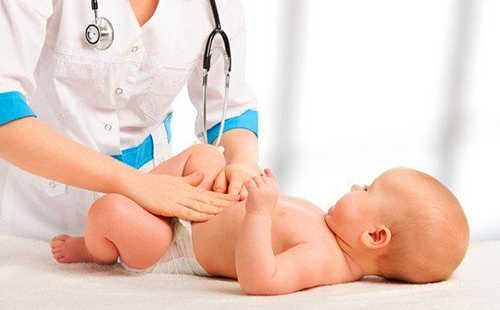
Why mucus appears
Feces with mucus in a child can cause nutritional disorders and various diseases. Some of them may carry a health hazard to the baby.
- Commonplace runny nose. If a baby has a viral infection with a runny nose, part of the mucus from the nasal cavity is swallowed, enters the intestine and comes out with feces. The mucus in this case is transparent, it is very small.
- Feeding mode Large intervals between meals, as well as large portions can lead to fermentation processes in the intestine and the formation of mucus.
- Improper mixture. Your child may have food allergies. artificial nutrition. To choose the right mixture, you need to consult a pediatrician.
- Incorrect breast attachment. The baby should stay longer with one breast in order to suck not only the front milk, but also the back milk. If the baby gets only the front milk, it will not be saturated. Also a baby may have green chair with mucus. When sucking back milk, your baby can receive an important and necessary enzyme for digesting dairy food - lactase.
- Early and improper introduction of complementary foods. Pediatricians recommend introducing complementary foods not earlier than 6 months. You can not start with vegetables and fruit puree, especially from fresh juices, because they will provoke fermentation processes in the intestine. A chair is an indicator by which you can determine whether any products are suitable for your baby or should you wait to delay their introduction. If only mom sees changes in the stool, you need to pause and abandon the "suspicious" dishes.
- Nursing mom's diet. If gas-forming products are present in the diet of a woman, this leads to flatulence, colic, irritation of the intestinal walls and mucous stools in infants. Seasonal fruits and vegetables should not be abused, they should be eaten little by little and you should look at the reaction of the baby. It is useful to keep a diary of a nursing mother.
- Atopic dermatitis. In addition to redness, irritation, flaking, itching of the skin, you can observe the mucous discharge during stool.
- Drug response. It is possible for the baby during breastfeeding, if the mother takes some drugs. It is clear that you need to carefully read the instructions, be aware of contraindications and first consult with your doctor. If, during colic, babies are given preparations based on simethicone (a substance that reduces the formation of gas in the intestine and contributes to their excretion), adverse reactions may occur in the form of mucus in the stool. After the end of therapy, these symptoms disappear.
- Intestinal obstruction. In medicine, this dangerous disease is called intestinal intussusception. It occurs as a result of squeezing sections of the intestine. Symptoms of intestinal obstruction: strong pain in the abdomen, vomiting, watery stools with blood and mucus. The child needs urgent hospitalization.
- Acute intestinal infections. Caused by bacteria, fungi, germs and viruses. These include: dysentery, salmonellosis, amebiasis, "intestinal flu" (rotavirus infection). Babies of infants are difficult to tolerate these diseases. They are accompanied by mucus clots, and the child often has diarrhea. Also characterized by such symptoms: fever, vomiting, lethargy, refusal to eat, sudden dehydration. At the slightest suspicion of an intestinal infection should seek medical help. In severe forms of the disease, the doctor will suggest hospitalization. It can not be neglected, especially if the child quickly lost weight and a lot of fluid.
- Gluten deficiency. In medical language, this disorder sounds like celiac disease. The problem is that the body of the baby does not digest gluten-containing food due to the lack of the necessary enzyme. Most often, celiac disease is manifested with the introduction of complementary foods. All foods containing gluten are excluded from the diet: semolina, barley, wheat groats, pasta, bread, bread, sweet pastries, etc.
- Dysbacteriosis. Quantitative and qualitative disorders in the intestinal microflora can manifest themselves in varying degrees. In mild forms of dysbiosis, colic, bloating, a small amount of mucus, and constipation occur. If the changes in the microflora are significant, the growth of pathogenic bacteria increases, and beneficial bifidumbus bacteria are suppressed, a lot of mucus appears in the stool, diarrhea, blood streaks, and residues of curdled milk. The formation of beneficial intestinal microflora is a long and delicate process. Some doctors prefer dysbacteriosis in infants not to heal, because the baby has a natural process of colonization of the intestines with microflora and the formation of immunity. Any intervention can disrupt the natural balance and "spoil" the intestines, which must independently "deal" with beneficial and pathogenic bacteria.
Lactase deficiency and mucus in stool
If the baby poops with mucus, possible cause may be lactase deficiency. This diagnosis appeared in pediatrics relatively recently. It is possible that ever since low-lactose mixtures have appeared on the domestic market. What are the symptoms of lactase deficiency and is it worth treating it?
- What is lactase deficiency? Infants often experience lactase deficiency, that is, they do not produce the required amount of the enzyme lactase necessary for the breakdown of lactose, the main carbohydrate of milk.
- What is it like? Most newborns have transient lactase deficiency. This means that over time it passes. In rare cases, congenital lactase deficiency occurs when the enzyme is not produced at all in the newborn. The baby has loose stools with mucus, lumps of undigested food, the child suffers from colic and gas. Also, lactase deficiency can be acquired: occurs after suffering intestinal infections and food allergies. During diseases, the ability of the small intestine to produce the desired enzyme is impaired, which leads to disruptions in the digestive system.
- What happens when there is too much lactose in the large intestine? The stool becomes liquid due to the large amount of water, frothy due to the formation of gases, green due to the rapid passage of food through the digestive tract, mucous due to irritation of the intestinal walls. The more undigested lactose, the more the baby feces with mucus.
The question arises how to treat lactase deficiency? First of all, it needs to be diagnosed correctly. To do this, contact your pediatric gastroenterologist, who will prescribe tests for the presence of carbohydrates in feces. The principle of treatment is minimal intervention in the independent process of enzyme production in infants. A non-dairy diet is recommended for breastfeeding mothers, breast-fed infants are recommended for low-lactose mixtures and lactase enzyme.
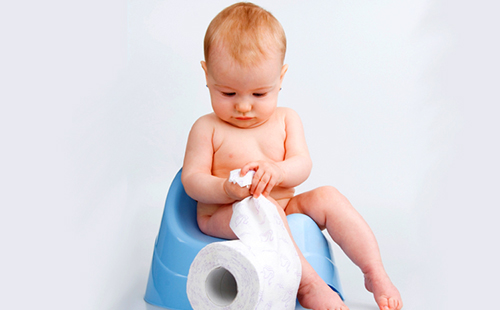
Green or yellow stools with mucus: 3 important points
The green color of the stool in children under one year old is considered the physiological norm. Milk diet gives just such a color feces. In addition, the rapid passage and digestion of food leads to a green chair (the greener it is, the faster the food is digested). If a child has a green stool with mucus, is it worth worrying?
- Make sure it is not diarrhea. Diarrhea is often accompanied by green color of feces, foam and mucus. A number of bright signs are added to these symptoms: anxiety of the baby, refusal to eat, weight loss, increased stool, abrupt emptying with cotton and gas, vomiting, high fever.
- Green mucus in the feces of the baby. Can talk about irritation of the large intestine. Nothing wrong with that. If the baby feels good and is gaining weight normally, no enzyme therapy or treatment for dysbiosis is needed. Some modern pediatricians believe that these appointments do not make sense. Abroad, children up to two years are generally not allowed to prescribe any beneficial bacteria: it is believed that they are not absorbed in the intestine and transit. With a bacterial infection, green mucus acquires a fetid odor, the baby's appetite disappears, there may be fever, vomiting. But these are already serious reasons for seeking medical help.
- Yellow stool with mucus in baby. In a child under one year old, the yellow color of the chair and its different shades are considered the norm. It is especially characteristic of children with artificialities. If the baby is transferred to another mixture, a color change in the direction of yellowness is also observed. A small part of the mucus, while the child is feeling well, should not bother the parents. If there is a lot of mucus, the baby behaves restlessly, gains weight poorly, these symptoms should not be ignored.
If a child has diarrhea green with mucus, an urgent need to consult a doctor. The danger of diarrhea in infants lies in the rapid dehydration of the body, which may pose a threat to life.
A chair with mucus in a child should not alarm the parents. Should worry the state of the baby, who has this symptom. The most important indicator of health for children of the first year of life is weight gain, good dream and showing interest in the world around us. If the crumb rejoices life, you should not be sad because of the mucus in his chair.
Print out